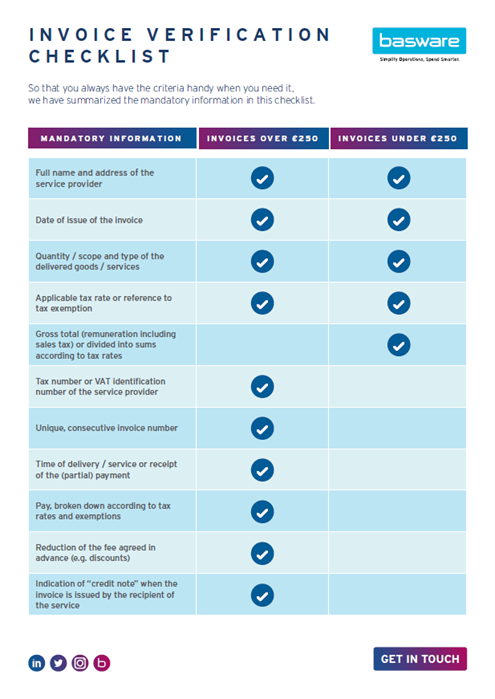- Blog
- Invoice verification checklist: You should pay...
Invoice verification checklist: You should pay...
When it comes to invoices, only those that contain the mandatory information required by law entitle companies to deduct input tax. Your invoice audit should ensure this. But often, there are some unknowns when it comes to this mandatory information. What is the mandatory information required? Are they the same for all bills? What does it mean for companies if this mandatory information is missing? What is the other purpose of the invoice verification? And how can invoice automation help?
Invoice verification is one of the day-to-day tasks of accounts payable (AP). The invoices must be checked both in terms of content and to ensure they align with the formal requirements of the Value Added Tax Act. On the one hand, companies use this as an opportunity to check whether the goods or services invoiced correspond to the orders and have also been delivered as well as the financial accuracy. On the other hand, they use this time to ensure the ability to deduct input tax. This is only possible if invoices contain all mandatory information in accordance with Section 14 (4) of the UStG.
This simplified invoice verification check applies to small-value invoices. This regulation is described in Section 33 of the Sales Tax Implementation Ordinance and mainly targets medium-sized companies. All invoices with a total amount of up to EUR 250 fall into this category. But whether it is a small amount or not, what are the mandatory information that should be included on an invoice?
For invoices over EUR 250, the following mandatory information is required according to §14 UStG:
-
Full name and address of the service provider
-
Full name and address of the recipient of the service
-
Date of issue of the invoice
-
Quantity / scope and type of the delivered goods / services
-
Applicable tax rate or reference to tax exemption
-
Tax number or VAT identification number of the service provider
-
Unique, consecutive invoice number
-
Time of delivery / service or receipt of the (partial) payment
-
Pay, broken down according to tax rates and exemptions
-
Reduction of the fee agreed in advance (e.g. discounts)
-
Indication of "credit note" when the invoice is issued by the recipient of the service
For small amount invoices, only the following mandatory information is required according to §33 UStDV:
-
Full name and address of the service provider
-
Date of issue of the invoice
-
Quantity / scope and type of the delivered goods / services
-
Applicable tax rate or reference to tax exemption
-
Gross total (remuneration including sales tax) or divided into sums according to tax rates
Download the invoice verification checklist here or print it out directly.


What happens if mandatory information is missing?
If invoices do not contain all the mandatory information required by the Value Added Tax Act, companies cannot deduct input tax. If this is not checked correctly during an invoice audit, the wrongly deducted input tax must be repaid in the event of a tax audit by the tax authorities.
As boring as the invoice verification step may seem, it is of great importance. But there is good news for accounts payable clerks: you can automate invoice verification. The automated solution checks the completeness of the mandatory information and recognises errors. This frees you from annoying routine tasks and gives you more time for strategic work. At the same time, the entire invoice process is accelerated. Payments can be made earlier so that you can keep your suppliers happy and no longer miss out on any discounts.
If the entire procure-to-pay process (i.e. from order to payment) is electronically mapped, the correctness of the content can also be checked automatically by comparing it with orders, payment plans, contracts, and incoming goods. This offers further, automated relief and an even faster process.
Your checklist for invoice processing
Basware’s automation solutions streamline invoice verification by ensuring all mandatory information is accurately captured and validated. Using this checklist for invoice processing alongside Basware’s tools helps reduce errors, maintain compliance, and secure input tax deductions.
With faster approvals and fewer manual tasks, AP teams can focus on strategic work while improving supplier relationships and capturing early payment discounts.
If you are thinking about how you can make the processes for incoming invoices and invoice processing more efficient through digitisation, please contact us!
For a better overview of how automated invoice processing works, download our factsheet here.
Subscribe to the Basware Blog!
Related
-
By Jason KurtzFour Forces Shaping the Future of AP with Invoice Lifecycle Management
-
By Christopher BlakeWhat is Invoice Lifecycle Management and How Does it Improve Cost, Control and Compliance?
-
By Olav MaasFrom Bottlenecks to Breakthroughs: Rethink PO Invoice Processing with AI
-
By Christopher BlakeHow To Fix Broken and Disconnected Invoice Processes with Invoice Lifecycle Management
-
By Jon StevensAP First, ERP Next: KION’s Smarter Path to SAP S/4HANA
-
By Adam LustigThe Integration Pyramid: Build It Right, Scale It Fast
-
By Jon StevensConnect the Dots Between AP and Your S/4HANA Migration
-
By Leigh CelonesProven Results With Basware’s InvoiceAI: Start Asking The Questions That Matter

